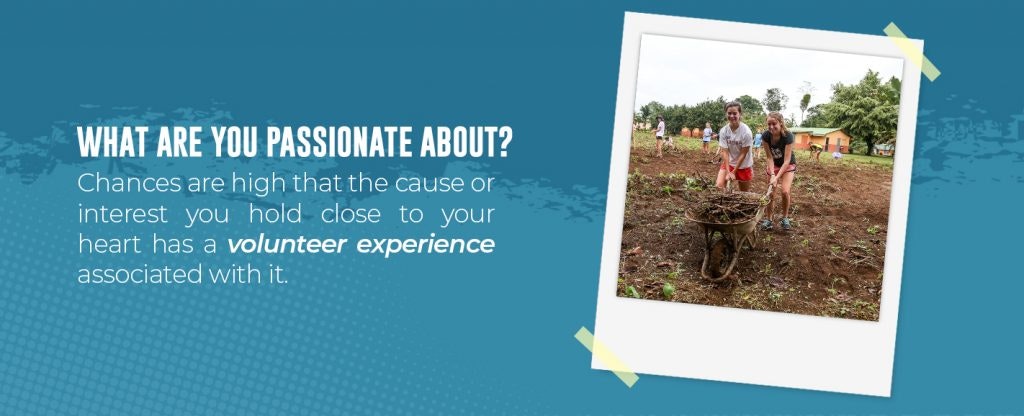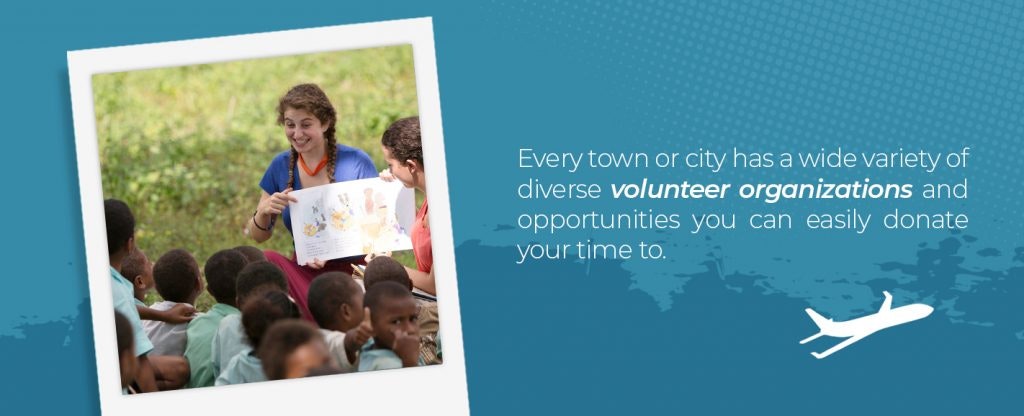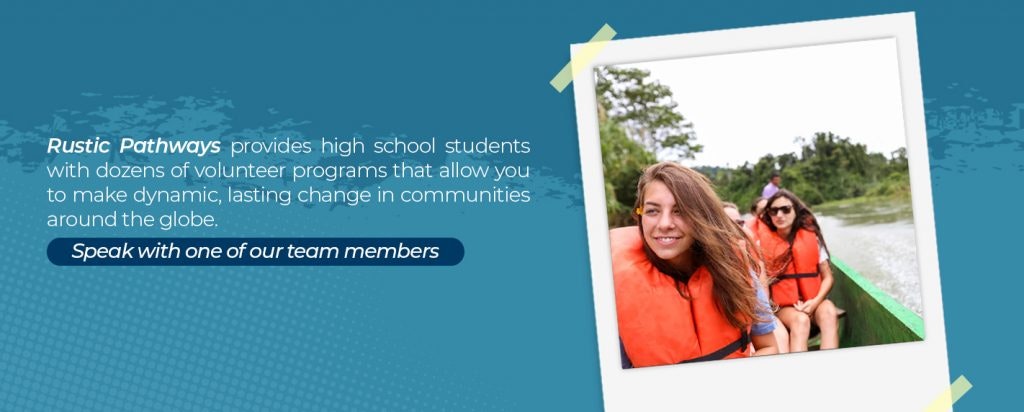1. Figure Out Your Interests
What are you passionate about? Chances are high that the cause or interest you hold close to your heart has a volunteer experience associated with it.
For example, if you love animals, you may consider volunteering at a local animal shelter here. For younger kids passionate about the environment, they can join a volunteer group that removes garbage from roadsides or plants new trees in local parks. Students who love building and working with their hands, can join a community event to help rebuild or remodel homes damaged by a fire, flood, or another natural disaster.

Are you unsure about which type of volunteer experience would interest you the most? Here are a few examples of common volunteer categories:
- Healthcare
- Arts
- Education
- Poverty
- Services for senior citizens
- Women’s services
- Hunger
- Youth sports team
- Mental health services
- Animal rights
- Homeless shelters
- Environmental conservation
This list is only a small sample of the many volunteer opportunities that may be available in your community. Even if you’re still not certain about which experience is right for you, that’s OK! It takes time to discover what you truly enjoy and care about, and the only way to do so is by trying.
If you’re still really unsure, you can always search a site like VolunteerMatch or check with your school, church, local library, or other community organization to see if they have a list of local needs. Then you can see which of these opportunities appeal to you.
2. Pay attention to local news and information
Often problems that affect your local community will be covered in the local media or on community sites. For instance, if you hear about shortages at the your local hospital or local food bank, you might set up a fundraiser to raise money for it. To figure out how to help your community, it’s helpful to research current local needs. If you address one of those, you’ll know your impact will be immediate and greatly appreciated.
3. Join Clubs or Other Extracurricular Activities
A great way to discover and develop a passion for volunteering is to participate in clubs or extracurricular activities that are already involved in local community projects. The clubs at your high school may have established ways to get involved in your local community. Some of them may be directly focused on community improvement projects, while others devote time each year to volunteering for a specific cause.
If possible, try to volunteer or take on leadership positions in these clubs and organizations. These roles will give you more responsibility for younger students and allow you to have more influence during the decision-making process.
When you act as a leader, you can encourage your group to increase the ways you give back to the community. If the organization or club doesn’t currently have a cause that it supports, you can start the discussion and help the group choose which volunteer opportunities you’ll complete together throughout the year.
4. Participate in Class Discussions and Be an Active Learner
Think about how much you’ve learned throughout your years in school—both in and out of the classroom. As you discover new ways to volunteer in your community, bring your thoughts and ideas back to the classroom with you. Many of the topics your classes cover throughout the year are directly related to a number of issues that impact your local community. History, civics, economics—these subjects and more continue to impact your local community every day.
As you explore the various social causes you could support, don’t be afraid to be an active learner by participating in class discussions. Ask questions to learn more about the state of our world and be courageous enough to express your own views, thoughts and ideas for positive change. Your teachers will take notice and encourage you to continue getting involved through discussions and volunteer work. In the future, some may even write you letters of recommendation that highlight your passion and kindness.
5. Volunteer Your Time to Help Local Community Organizations
Once you’ve explored your options and gotten involved in your school or local library, you may want to do more. Local community organizations are great places to volunteer.

Every town or city has a wide variety of volunteer organizations and opportunities you can easily donate your time to. From established centers that provide food, clothing, safety, and housing to the community to newer groups that champion multiple community projects, these organizations may include:
- Animal shelters
- Natural parks and community parks
- Local food bank and soup kitchen
- Local libraries
- Local homeless shelter
- Museums and historical landmarks
- Churches
- Political campaigns
- Community athletic centers
- Schools
- Local shelter
- Senior Centers and retirement homes
- Children’s hospitals and nursing homes
- Natural disaster relief services
- Local nonprofit organizations
- Health-related services
You can choose one of these areas to advocate for, or you can lend your time to many different projects. The beauty of volunteering is that anyone with any interest and ability can make a positive impact on the lives of others. One project, one day, or even one hour is all it takes to change the world around you.
Read More: How Rustic Pathways Impacts Students
The Importance of Getting Involved and Helping Local Communities
Historically teens and young adults have had a high rate of volunteerism. But now their help is needed more than ever. The University of Maryland’s DoGood Institute found in a recent report that nearly half of the nonprofit leaders surveyed said that recruiting enough volunteers is a big problem. At the same time the need for services has grown.
According to the Pew Research Center, common community problems include a lack of affordable housing and drug addiction. Generally, health-related issues and economic troubles are age-old concerns. On top of that, problems such as crime or natural disasters afflict a number of regions.
Acts of compassion made through volunteering can help make life better for those in your community faced with such life-altering situations. Supporting these causes not only benefits those presently struggling, but it also enables volunteer organizations to address similar challenges in the future. Since our own friends and family members may one day encounter similar obstacles, it’s important that we all do our part to better our lives through volunteering.
With that in mind, the importance of volunteering can’t be overstated. Any time you choose to donate your time to support a local cause, you’re helping make a difference.
Benefits of Volunteering for Students

Not only is volunteering a great way to improve your local community and the lives of everyone who lives there, but it’s also a great way to develop key skills and attributes that set you apart from the crowd. Volunteering builds character and helps you become a more well-rounded person. Here are six benefits of donating your time to helping local communities.
1. Develop Skills That Stand Out
Volunteering for nonprofit organizations or local businesses is a fantastic learning experience for high and middle school students too. Though you may get involved with a community project because it showcases your current talents, you’ll also develop new skills as you work. You can:
- Develop new technical skills, such as how to operate machinery and software
- Learn about logistics as you organize, collect or distribute supplies
- Gain leadership skills that will benefit you in any group setting
- Combine love of biology with service at a community garden and learn horticulture at the same time
These skills are key for both college and job applications. Plus, volunteering helps with time management. Between school, work, family, and friends, it may seem like an impossible feat to integrate volunteering into your schedule. However, studies have shown that those who volunteer actually feel like they have more time than those who don’t.
2. Boost Your Confidence and Self-Esteem
Perhaps the largest emotional benefit of volunteering is that it helps you develop self-esteem, improve your confidence, and increase your feelings of self-worth. Connecting with others helps stabilize your emotions, and studies show that volunteering improves your mental health.
Most people feel good when they give back to a worthy cause. Feelings of satisfaction and altruism, along with the pride of seeing your work improve the lives of others, are just a few of the emotional benefits volunteering provides.
Volunteering also allows you to find a new place within your community. High school students are going through many changes as they transition into adulthood. If you’ve ever felt alone or like you haven’t found the activity that suits you best, volunteering may help you discover something new about yourself.
Getting engaged with the community by volunteering surrounds you with new opportunities, friendships, and ways you can enjoy your time. Not only will you not feel alone, but you’ll also be helping other people who may feel lonely, too.
3. Learn Empathy and Compassion
Volunteering promotes empathy, which in turn promotes behaviors that benefit society. When we choose to donate our time to those in need, we form a deeper emotional connection to the world around us. These experiences allow us to see what life is like in someone else’s shoes and recognize the parallels in our own lives.
Many volunteers often discover that those who need our help are not much different than themselves. We all love our families and cherish our friendships. When you see others—especially fellow students—struggling through one of life’s common obstacles, not only can you relate to their situation, but you’re also inspired to help. This empathy leads us to share our compassion with others, bringing out the best in all of us.
Volunteering is empathy in action. Although you aren’t volunteering your time and effort to get something in return, studies have shown that you do receive an especially powerful benefit: love. There is an undeniable relationship between the love you put into the project and the love you receive in return.
4. Improve Your Social and Relationship Skills
Empathy and compassion enable us to view the world from a new perspective. As we internalize the struggles and challenges of others, we learn more about those we live, work and go to school with.
The people you volunteer with feel this empathy, as well. When you work together, you make an emotional connection with one another. Volunteering alongside others with the same passion brings us closer together.
You won’t need to wait long to see these relationships blossom. Many people find that they connect quickly with their fellow volunteers and with the people they’re aiming to help.
5. Earn Relevant Work Experience
One of the benefits of volunteering in high school is that you earn relevant work experience that helps your career. Research shows that the concept of civic-mindedness is becoming increasingly more important in the workplace.
Employers are noticing that employees in the workforce—especially younger individuals—are socially-aware and try to work in fields or companies that share and reflect their values. The skills you can learn through volunteering showcase your strengths regarding teamwork and innovation, two qualities today’s employers consider important.
Aside from the actual skills, the social causes you’ve supported can also increase career development. Many companies and corporations actively support volunteer programs and encourage employees to engage with these organizations. Not only will your previous experience look good on your résumé, but the category in which you volunteered can help you build a positive relationship with an employer that advocates for the same causes.
6. Increase Your Happiness
When you choose to volunteer, you’re making the decision to selflessly work for the good of others without payment. This act of kindness is not only empowering, but it can also fill you with a profound sense of purpose.
Whether you choose to volunteer in a capacity that has personal significance in your life—or if a new cause you’ve encountered finds a special place in your heart— you’ll be happier as you discover a new purpose.
Make a Lasting Impact in the World With Rustic Pathways
Volunteering is a great way to impact the lives of your family, friends, and neighbors—and you don’t need to limit these acts of kindness to only your community. High school students can join volunteer programs that create lasting change around the world.
Rustic Pathways provides high school students with dozens of volunteer programs that allow you to make dynamic, lasting change in communities around the globe. Choose from 17 destinations where your help will make a positive impact.
Learn more about our spring break and summer travel programs for high and middle school students. Speak with one of our team members to find the right travel experience for you. When you’re ready to get out into the world and make a difference, you can book your trip today. Enroll in your desired program to save your spot for a specific volunteer opportunity.
High school students have the power to change the world. Make a lasting impact on the lives of those who need it most by joining a fun and enriching volunteer program with Rustic Pathways.






